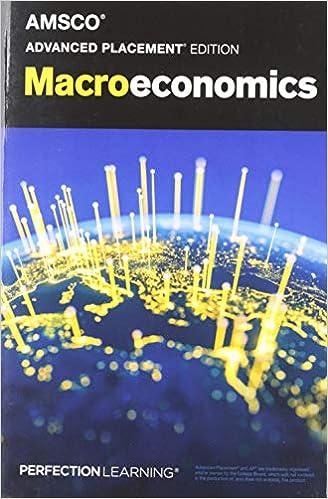Question
True / False 1.Woods argues that it is increasing consumption that drives wealth creation. 2.The problem with bankruptcy is that we lose these assets and
True / False
1.Woods argues that it is increasing consumption that drives wealth creation.
2.The problem with bankruptcy is that we lose these assets and the production they used to generate.
3.Woods argues that Fannie Mae should be abolished but that Freddie Mac should be retained.
4.Woods maintains that money is the most socialized sector of our economy.
5.Woods cites Mises as having said that the history of money is the history of government efforts to destroy money.
6.Wallison notes that Bear Stearns was the largest of the big five investment banks, which included Goldman Sachs, Morgan Stanley and Merrill Lynch.
7.Wallison argues that the immediate effect of the rescue of Bear was moral hazard - creditors of other investment banks don't have to worry about their bank failing; the Fed will save them.
8.The failure of Lehman Brothers, due to its inability to borrow funds, came shortly after the Treasury Department took over control of Fannie Mae and Freddie Mac.
9.Wallison argues that investors were surprised at the failure of Fannie and Freddie, as they didn't realize that these gigantic mortgage firms held over $2.5 trillion in subprime mortgages.
10.Wallison contends that it was a massive mistake for the Fed not to bail out Lehman, given that it had bailed out Bear Stearns.
11.Before the rescue of Bear Stearns, only one other large nonbank firm had been the recipient of a government bailout.
12.According to Salerno, the so-called "war on cash" started with the Bank Secrecy Act of 1970.
13.In Switzerland, cash payments in excess of about $10,600 are banned.
14.By imposing a zero fee on cash withdrawals from bank accounts, the government of Greece will be able to impose negative interest rates on deposits.
15.The largest denomination of U.S. currency was the $100,000 bill.
16.As pointed out by Dowd, India declared essentially a "war on cash" by withdrawing from circulation their lowest denomination notes.
17.If we buy the argument that cash should be outlawed because criminals use cash, Dowd sarcastically suggests that, to be logical, we should also outlaw defense attorneys.
18.According to Rickards, the U.S. dollar nearly ceased being the world's reserve currency in 1978.
19.According to Rickards, the collapse of the dollar could lead either to inflation (like the 1970s) or to unemployment (like the 1930s).
20.Given the Fed's actions since 2008, why don't we have serious inflation?Rickards argues that one reason is that our economy is structurally damaged.
--------------------
Woods - Chapter 7 (end)
Wallison: Bear Stearn Bailout Caused the Crisis:
https://tinyurl.com/y8uya7nc
Salerno, "Why Government Hates Cash":
https://mises.org/library/why-government-hates-cash-0
The War on Cash ... (Dowd):
https://mises.org/wire/war-cash-even-worse-it-seems
Rickards, "The Death of Money":
https://www.aei.org/articles/the-death-of-money/
Step by Step Solution
There are 3 Steps involved in it
Step: 1

Get Instant Access to Expert-Tailored Solutions
See step-by-step solutions with expert insights and AI powered tools for academic success
Step: 2

Step: 3

Ace Your Homework with AI
Get the answers you need in no time with our AI-driven, step-by-step assistance
Get Started


